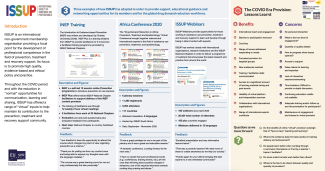Maintaining the Provision for Professional Development in the COVID Era: Three Practical Examples

ISSUP participated in the European Society of Prevention Research (EUSPR) 2021 Conference which took place online from the 29th of September to the 1st of October by presenting an oral poster that focussed on three practical examples of provision offered in the COVID era by ISSUP.
The theme of the conference, which was chosen to encourage presenters to comment on the impact of COVID 19 on prevention research and practice, was ‘Prevention in a COVID Recovery Society’.
As an international organisation, ISSUP is used to relying on digital means for communications, however since the global pandemic, it has had to substantially increase its provision of online services in order to maintain its service to the global drug demand reduction community.
Having adapted the work within ISSUP significantly so as to continue to provide educational support and networking opportunities for prevention practitioners during the pandemic, we were able to share examples of our work from the past two years through the EUSPR conference input. During the conference, ISSUP Scientific Support Team presented an oral poster that highlighted the following three examples of the ways we have adapted our work during the covid pandemic:
- ‘Introduction to Evidence-based Prevention’ (INEP) PLUS training programme:
The Introduction to Evidence-based Prevention (INEP) is a self-led online training course that was developed by Charles University (CUNI). ISSUP has trained 40 facilitators from 20 ISSUP National Chapters to provide a facilitator-led version of INEP.
- ‘Drug Demand Reduction in Africa: Prevention, Treatment and Epidemiology’ virtual conference:
In collaboration with our National Chapter in South Africa and international partner organisations, in particular the African Union, ISSUP organised its first online conference last fall. It was a series of six online plenaries, and it brought together national and international experts. Over 5,000 people from 117 countries joined the conference.
- ISSUP Webinar education provision:
Prior to the pandemic, ISSUP organized one webinar a month. Since April 2020 More than 100 webinars have been held, with over than 26,000 participants from 100+ countries participating and offered in a total of 12 different languages.
All 3 contributions have received substantial positive feedback from those who were involved as providers or participants. Some of the comments are included on our poster.
As part of our presentation, we reflected on the benefits of online educational training and knowledge exchange as well as some of the other lessons we have learned. We will use these to inform the development of future ISSUP activities and projects.
Lessons learnt
Apart from preventing the spread of coronavirus, there have been many other advantages to moving online. For example, by holding an online “activity” rather than an in-person event, the barriers to participation, such as the cost of travel and accommodation, have been removed. Working with interpreters has allowed us to communicate with members who otherwise would have been unable to engage with the content being presented.
In addition to making conference and webinar recordings freely available, we have published related resources, which has allowed participants to engage in knowledge exchange beyond the event and addresses the issue of time differences. This has allowed people to attend the webinar at a time acceptable to them.
In summary, in a time of restriction, we believe we have increased access to information and professional development opportunities through addressing key issues such as location, cultural and language differences of our members. Focusing our efforts on improving our online provision has taught us how to strengthen learning for professionals beyond pandemic constraints and how to be more efficient and effective in delivering capacity building provision.
Whereas there are undoubtably benefits of online provision, there are critical challenges that we continue to reflect on. According to feedback from INEP Plus training, people do miss the interaction between other members of the group, which fosters bonding, creates a positive group dynamic, and can enhance the learning experience. This raises questions that merit additional investigation, such as how does peer bonding influence the learning environment during training activity? What is the value and impact of the three approaches to training - self-led, online, and face-to face? Is face-to-face training more effective than virtual teaching?
In terms of webinars and conferences, while we have reached far greater numbers of participants, we need to investigate if the quality and depth of the experience might be affected when events are delivered online? Although we support Q&A sessions and have set up online forums to promote additional discussion, we wonder whether less interaction with the presenter and other participants inhibits critical analysis and reflexivity. Further research on how individuals participate in online learning experiences, such as webinars, will be beneficial in determining how to enhance the way we facilitate the learning process.
As ISSUP will continue to plan online training, we will be addressing additional key questions of concerns, such as the distinction between quality and quantity; the impact and outcomes resulting from the COVID era virtual learning provision and what they offer for the future; and perhaps most importantly from an ISSUP perspective is what approaches are the most effective and evidence-based in terms of learning experience and professional development. As we face an unprecedented situation there is a lot to learn as the evidence base on online learning and professional development increases.
Moving forward, we will embrace this time as a learning opportunity and adapt our approach by offering a blend of both digital and in person experiences when it is safe to do so. We also hope that the questions we have raised will be addressed and explored in future studies so results can inform our practice and work in professionalising the drug demand reduction workforce.